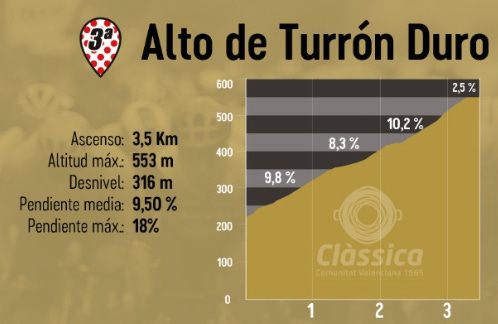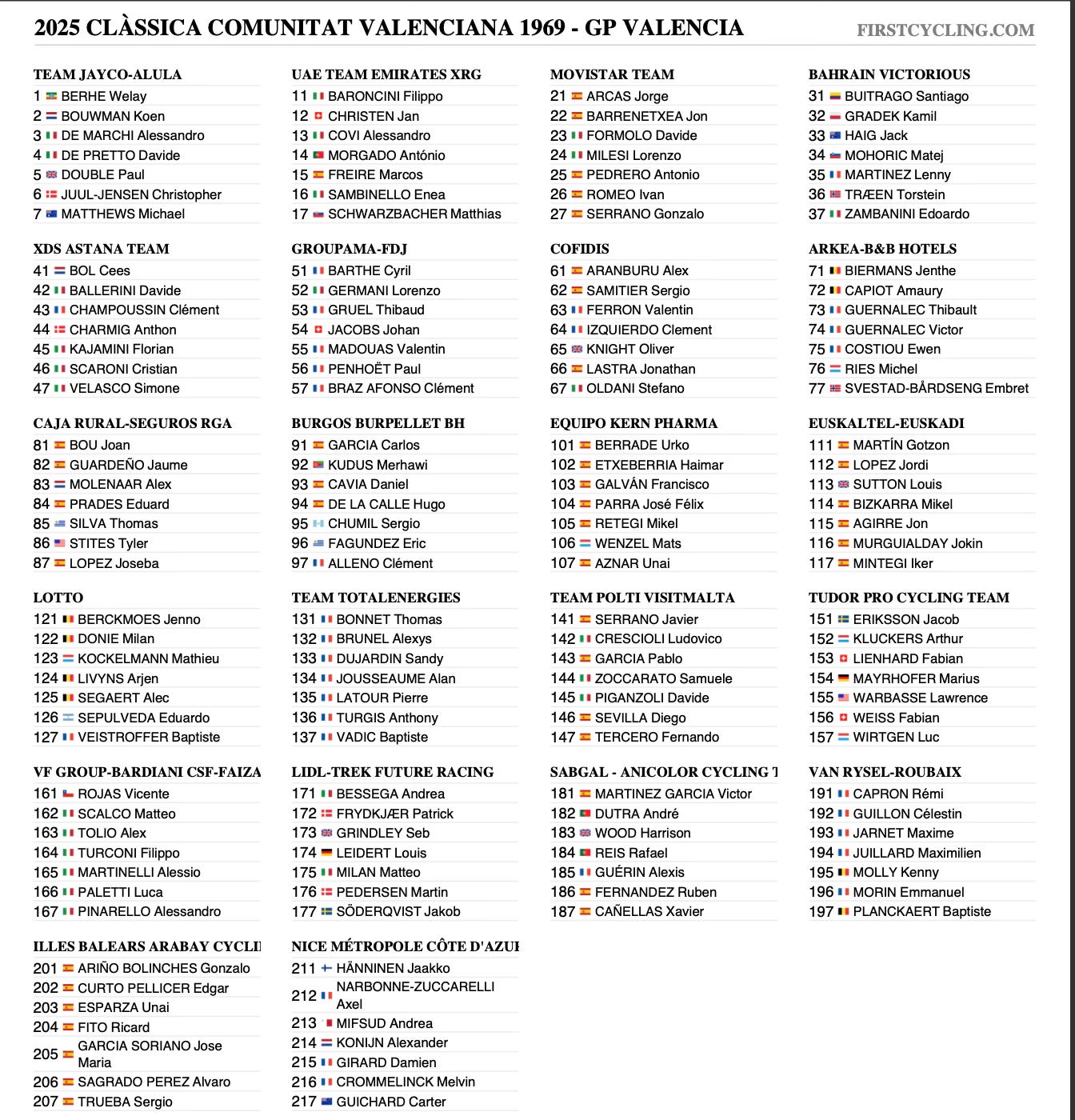41st Clàssica Comunista Valenciana 1969 - Gran Premio V Preview 🇪🇸🚴♂️ (1.1)
Valencia - La Nucía (184km) Sunday 26th January 2025.
The early season Spanish races have begun and the 41st edition of the Clàssica Comunista Valenciana 1969 taking place on Sunday looks to be particularly intriguing...
Race History
Courtesy of bikeraceinfo.com, The “Classica Comunista Valenciana 1969” race is the old Trofeo Luis Puig (1981-2005). For the first ten years, the race was known as the Gran Premio Valencia. The first ever edition was won by Spaniard Carlos Echeverría of Kas - Kaskol, who had previously won two stages of La Vuelta a España in 1965 and 1966. The race was held on the 23rd of February 1969, so a month later than its modern day slot.
The race was run from 1969 up until 2005, where after which, there was a 16 year hiatus. The race returned in 2021 under a new name, its current one, and was initially given a 1.2 rank until it was upgraded in 2023 to a 1.1 level race.
Since the return of the race in 2021, each edition has ended with a sprint finish.
The previous 4 winners are as follows:
2021: Lorrenzo Manzin (Team Total Direct Energie) 🇫🇷
2022: Giovanni Lonardi (EOLO-Kometa) 🇮🇹
2023: Arnaud De Lie (Lotto Dstny) 🇧🇪
2024: Dylan Groenewegen (Team Jayco AlUla) 🇳🇱
If there was ever an edition where it is likely the sprinters miss out, it is certainly the 2025 route. This is reflected by the lack of pure sprinters on the startlist this year compared to the previous few editions.
The Route
There are 3 categorised climbs on the menu spread across 185km of racing with the race beginning in Valencia. The first 70km are flat, leading to an intermediate sprint at Barxeta, where those who have made the breakaway will be rewarded. An uncategorised test of 2km at 5.1% follows the sprint point, before the riders tackle the Alto de Barx. A category 3 test standing 5.9km long with an average gradient of 4.9%, the climb is a modest test and is unlikely to have any significant impact considering the summit comes with around 95km to go.
Some undulating roads follow before the riders take on the highest ranked climb of the day, the category 2 Coll de Rates. The climb has been used four times previously in La Vuelta a España, with the most recent inclusion coming on stage 20 in 2016 where Pierre Latour famously caught and then attacked Colombian climber Darwin Atapuma on the final slopes of the Alto de Aitana, despite looking like he had run out of gas. The Coll de Rates, isn’t nearly as close to Alto de Aitana in terms of it’s difficulty, but will still provide a test those faster men in the race who struggle on the climbs. This will be the climb where the teams who want to distance any fast finishers, will need to put in the ground work and set a strong tempo to sting the legs of their opponents. 5.7km at 5.2% is enough road and steepness to set a strong tempo and set things into motion before the final, and most brutal climb of the day.
The Alto de Turrón Duro may be the shortest categorised climb of the day, standing at 3.5km, but it is the most brutal, with a stinging average gradient of 9%. There will be big gaps made on this climb as the front of the race will likely become a selective group of riders. A maximum gradient of 18% will cause plenty of suffering to the majority of the peloton.
With the summit coming 9km from the finish line, the race is still far from over at this point meaning riders will have time to get back to the front of the race if they have been distanced but not too big a margin.
Unless there is a rider who is on a supreme day and is so much stronger than the rest of the field, meaning he can ride away on the climb, I think the descent and final flat few kilometres will be where the race is actually won. We have seen in many races in the past, that decisive moves on stages such as this, can be successful if made over the top of the climb or in the proceeding kilometres after when other riders in the group look at each other and hesitate.
If there is still a group of riders together under the flamme rouge and nobody has been able to make the decisive move, the race will likely finish in a reduced group sprint in the town of La Nucía.
Provisional Startlist
8 WorldTour teams have been invited to this year’s race, and most of them have sent some very strong riders. In particular, UAE Team Emirates XRG, Bahrain - Victorious, and Movistar Team, have sent very strong squads to this race, and will be hoping for victory.
Contenders
I have separated the contenders for this race based on the potential race winning scenarios and placed each rider into the category which I think they would be best suited to. I have also given them a star rating based on how strong a favourite I think they are too, with 3 ⭐️ being the most.
Considering the profile of this race, it is almost a lottery as to who will win this race, because there are so many different race scenarios and no riders who are head and shoulders above the rest, like a Tadej Pogačar or Remco Evenepoel etc… Hence why there are a lot of contenders. Typically someone who I haven’t mentioned will probably go on to win now, but here are the guys likely to be in the mix.
(I have only picked contenders based on the provisional startlist above, some team selections could be subject to change.)
Attackers on the climb - Good Chance if they can get solo or cooperate in a small group.
Paul Double (Team Jayco AlUla) ⭐️⭐️
Jan Christen (UAE Team Emirates - XRG) ⭐️⭐️⭐️
Alessandro Covi (UAE Team Emirates - XRG)⭐️
Marc Hirschi (Tudor Pro Cycling Team) ⭐️⭐️⭐️
Santiago Buitrago (Bahrain Victorious) ⭐️⭐️⭐️
Jack Haig (Bahrain Victorious) ⭐️⭐️
Lenny Martinez (Bahrain Victorious) ⭐️⭐️⭐️
Clément Champoussin (XDS Astana Team) ⭐️⭐️
Florian Samuel Kajamini (XDS Astana Team) ⭐️
Ewen Costiou (Arkéa - B&B Hotels) ⭐️⭐️
Mats Wenzel (Equipo Kern Pharma) ⭐️
Davide Piganzoli (Team Polti VisitMalta) ⭐️⭐️
Rubén Fernández (Sabgal / Anicolor) ⭐️
Alessandro Pinarello (VF Group - Bardiani CSF -Faizanè) ⭐️
Opportunistic attackers (after the climb) - Could be the best option to make a race winning move when others hesitate.
Matej Mohorič (Bahrain Victorious) ⭐️⭐️
Iván Romeo (Movistar Team) ⭐️⭐️
António Morgado (UAE Team Emirates - XRG) ⭐️⭐️⭐️
Filippo Baroncini (UAE Team Emirates - XRG) ⭐️
Valentin Madouas (Groupama - FDJ) ⭐️⭐️
Davide De Pretto (Team Jayco AlUla)⭐️
Simone Velasco (XDS Astana Team) ⭐️
Urko Berrade (Equipo Kern Pharma) ⭐️⭐️⭐️
Louis Sutton (Euskaltel - Kuskadi) ⭐️
Fast finishers - Will need to put in a great ride on the final climb and hope teammates can chase down any attackers - most unlikely but can’t be ruled out.
Michael Matthews (Team Jayco AlUla) ⭐️⭐️⭐️
Jon Barrenetxea (Movistar Team) ⭐️⭐️⭐️
Gonzalo Serrano (Movistar Team) ⭐️⭐️
Edoardo Zambanini (Bahrain Victorious) ⭐️⭐️⭐️
Jenno Berckmoes (Lotto Dstny) ⭐️⭐️
Paul Penhoët (Groupama - FDJ)⭐️
Alex Aranburu (Groupama - FDJ)⭐️⭐️
Davide Ballerini (XDS Astana Team) ⭐️
Gotzon Martín (Euskaltel - Euskadi) ⭐️
Eduard Prades (Caja Rural - Seguros RGA) ⭐️
Javier Serrano (Team Polti VisitMalta) ⭐️










Great preview Joe ! I think it's gonna be an ugly fight between Bahrain and UAE